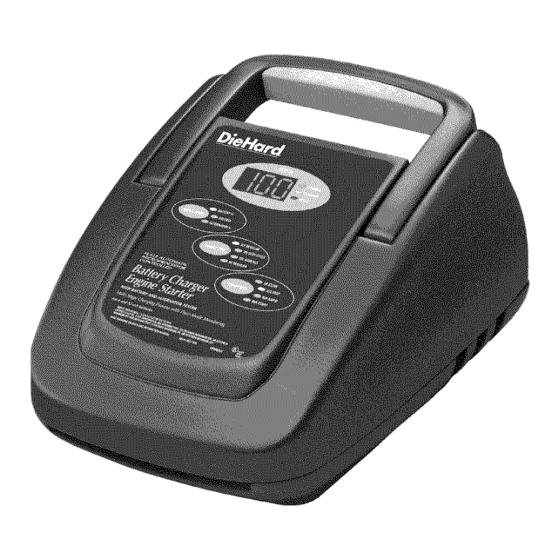DieHard 200.71225 Instrukcja obsługi - Strona 4
Przeglądaj online lub pobierz pdf Instrukcja obsługi dla Ładowarka DieHard 200.71225. DieHard 200.71225 20 stron. Microprocessor controlled, fully automatic operation battery charger with engine starter plus battery and alternator tester for 6 and 12-volt batteries
Również dla DieHard 200.71225: Instrukcja obsługi (17 strony)

wARNINg – RISK OF EXPLOSIVE gASES.
wORKINg IN VICINITY OF A LEAd-ACId BATTERY IS dANgEROUS.
BATTERIES gENERATE EXPLOSIVE gASES dURINg NORMAL
BATTERY OPERATION. FOR THIS REASON, IT IS OF UTMOST
IMPORTANCE THAT YOU FOLLOw THE INSTRUCTIONS EACH TIME
YOU USE THE CHARgER.
TO REdUCE RISK OF BATTERY EXPLOSION, FOLLOw THESE
INSTRUCTIONS ANd THOSE PUBLISHEd BY BATTERY MANUFAC-
TURER ANd MANUFACTURER OF ANY EqUIPMENT YOU INTENd TO
USE IN VICINITY OF BATTERY. REVIEw CAUTIONARY MARKINg ON
THESE PROdUCTS ANd ON ENgINE.
2.
PERSONAL PRECAUTIONS
2.1
Consider having someone close enough by to come to your aid when you
work near a lead-acid battery.
2.2
Have plenty of fresh water and soap nearby in case battery acid contacts
skin, clothing, or eyes.
2.3
Wear complete eye protection and clothing protection. Avoid touching
eyes while working near battery.
2.4
If battery acid contacts skin or clothing, wash immediately with soap and
water. If acid enters eye, immediately flood eye with running cold water for
at least 10 minutes and get medical attention immediately.
2.5
NEVER smoke or allow a spark or flame in vicinity of battery or engine.
2.6
Be extra cautious to reduce risk of dropping a metal tool onto battery. It
might spark or short-circuit battery or other electrical part that may cause
explosion.
2.7
Remove personal metal items such as rings, bracelets, necklaces, and
watches when working with a lead-acid battery. A lead-acid battery can
produce a short-circuit current high enough to weld a ring or the like to
metal, causing a severe burn.
2.8
Use charger for charging a LEAD-ACID battery only. It is not intended to
supply power to a low voltage electrical system other than in a starter-mo-
tor application. Do not use battery charger for charging dry-cell batteries
that are commonly used with home appliances. These batteries may burst
and cause injury to persons and damage to property.
2.9
NEVER charge a frozen battery.
2.10
wARNINg:
chemicals known to the State of California to cause cancer and birth de-
fects or other reproductive harm.
Pursuant to California Proposition 65, this product contains
2
•
•
